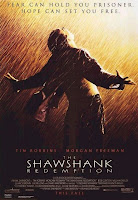Yesterday, I took a look at another classic from 1962's Best Picture race...

.jpg)

To Kill A Mockingbird
Director:
Robert Mulligan
Screenplay:
Horton Foote
(based on the novel by Harper Lee)
Starring:
Gregory Peck, Mary Badham, Philip Alford, John Megna, Frank Overton, Brock Peters, Collin Wilcox, James Anderson, Robert Duvall
Academy Awards:
8 nominations
3 wins, including Best Actor (Peck) and Best Adapted Screenplay
Harper Lee's Pulitzer Prize-winning novel made its way into most high school English classrooms, including the one I attended at Gymea Technology High School, making it a familiar story to most. For some reason, though, my main memory of the book is of the rabid dog. That and the wacky names of all the characters: Atticus, Scout, Jem, Dill. Even the Sheriff's name is Heck.
In a small Southern town during the 1930s, lawyer Atticus Finch (Peck) raises his two children, Scout (Badham) and Jem (Alford). The kids befriend their neighbour's visiting nephew, a young boy named Dill (Megna), and the three make their own fun on the streets, mostly by making up stories about the mysterious Boo Radley (Duvall), their reclusive neighbour that none of them have seen. Meanwhile, Atticus is assigned to defend Tom Robinson (Peters), a young black man accused of assaulting a white girl named Mayella (Wilcox). The girl's father, Mr. Ewell (Anderson) is not particularly happy about Tom receiving any kind of defense and he has a gang of likewise angry townsfolk on his side. Atticus attempts to keep the situation in the town under control as he mounts his case for Tom's innocence.
Atticus Finch may well be the most morally upstanding character in fiction. He is considerate, compassionate and incorruptible. Calm under tense situations, he stands up to bullies with a mild and rational temperament. A loving father, he teaches his children to adhere to the same moral code. And since it is typically a character's flaws that make him a fascinating study, Atticus comes across as entirely uninteresting as a lead character because he appears to be flawless. Don't get me wrong. We still love him and want him to succeed, but the truly interesting elements of To Kill A Mockingbird lie elsewhere.
To be honest, though, Atticus probably isn't the lead character anyway. The novel is written in the first person by Scout (and the film is narrated by the adult version of her, voiced by an uncredited Kim Stanley), so it would seem plausible to call her the lead. The story can certainly be considered her coming of age tale. Indeed, both Finch children learn a great deal over the course of the picture, the first half of which concentrates on their adventures.
.jpg)
Then, there is the grand courtroom scene. Even if Atticus himself is prosaically simple, the battle that he inevitably faces in court (and outside the court, for that matter) is dramatic and affecting. It is no secret that I love legal dramas, particularly those gotcha moments when a lawyer wins a point against his opposition. Atticus certainly has no shortage of those moments. However, the events in the courtroom seemed somehow unbelievable. Granted, I don't have a great knowledge of U.S. criminal law in the 1930s - and perhaps it is due to my familiarity with modern legal dramas both on the big and the small screen - but there were several moments during both lawyers' cross-examinations that I expected to hear the other yell, "Objection!" Some of the claims being presented seemed legally spurious. Nonetheless, the direction and the cast help to retain a tense atmosphere.
Gregory Peck won his only Oscar for this iconic role and despite my misgivings about the character's dramatic appeal, Peck's portrayal is strong and grounded. Both Brock Peters as the accused man and Collin Wilcox as the accusing woman deliver powerful performances making the most of their brief moments on the witness stand. And yes, that's a young Robert Duvall making his film debut as the mute Boo Radley.

.jpg)

.jpg)




.jpg)




